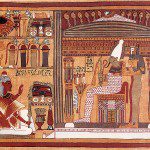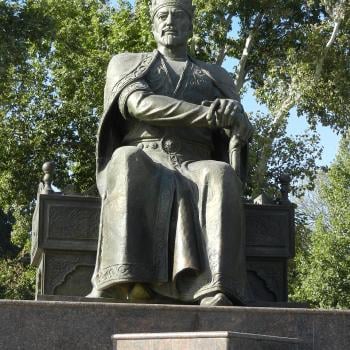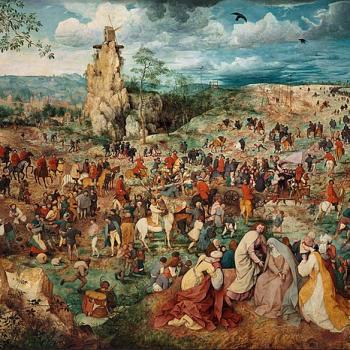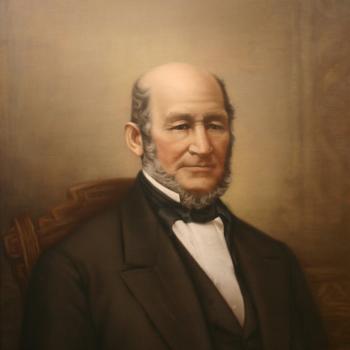
A new article has appeared in Interpreter: A Journal of Latter-day Saint Faith and Scholarship: “Understanding the Lamanite Mark,” writtten by Clifford P. Jones
Abstract: The Book of Mormon describes a dark mark on the skin that distinguished people who rebelled against God and his laws from those who obeyed God. The Old Testament refers to a mark that fits this description and has nothing to do with natural skin color. The law of Moses prohibited the Lord’s covenant people from cutting sacrilegious marks (ancient tattoos) into their skin. The Bible simply calls these prohibited tattoos “marks” (Leviticus 19:28). This biblical meaning of the word mark, together with biblical meanings of other related words, helps us understand all Book of Mormon passages associated with the Lamanite mark.

Can atheists be good?
The unequivocal answer is that, yes, unbelievers can be good — and I hasten to add that, in my experience and reading, they quite often are. There is actually biblical support for this, in such passages as Romans 2:14-15:
For when the Gentiles, which have not the law, do by nature the things contained in the law, these, having not the law, are a law unto themselves: Which shew the work of the law written in their hearts, their conscience also bearing witness, and their thoughts the mean while accusing or else excusing one another. (Romans 2:14-15)
Now, I’ll admit that that particular selection of Jacobean English is more than a tad obscure. So let’s try, say, the Common English Bible:
Gentiles don’t have the Law. But when they instinctively do what the Law requires they are a Law in themselves, though they don’t have the Law. They show the proof of the Law written on their hearts, and their consciences affirm it. Their conflicting thoughts will accuse them, or even make a defense for them.
The apostle Paul is saying in that passage that even unbelievers — the “Gentiles” in his day were people who had not received or accepted biblical revelation — have moral principles “written in their hearts.” For most things, they don’t need direct divine commands to judge right from wrong. They might be unaware of a divine prohibition on smoking cigarettes or a divine commandment to partake regularly of the sacrament, because such things are matters of special revelation given to the Latter-day Saints. But they know, mysteriously but quite certainly, that murder is wrong, as is tormenting animals for pleasure, and that kindness and service to others are good. Some mainstream Christian thinkers have seen in this an effect of “general revelation,” not unlike what Jewish thinkers have called “Noahide laws” or “Noachic laws.”
The question — and it is a very important one — is, What is the basis for such moral “knowledge”? I’m not inclined at this point to try to answer it, except eventually to suggest what the basis probably cannot be.
All of those who read this blog entry, I hope, will agree that the Holocaust was morally wrong. But on what basis do we come — instantly, I would presume — to that judgment?
In his book A Devil’s Chaplain, the Oxford biologist and polemical atheist Richard Dawkins writes that
Science has no methods for deciding what is ethical. That is a matter for individuals and society. (Richard Dawkins, A Devil’s Chaplain: Reflections on Hope, Lies, Science, and Love [New York: Houghton Mifflin, 2003], 34)
And, of course, he’s right on that. But on what basis are individuals and society to make such decisions?
We say that the Holocaust was wrong. However, advocates of the Third Reich not only believed it to be right but an imperative moral duty. (They were convinced Social Darwinists.) Were they wrong? Or was it merely a matter of preferences, like a taste for broccoli or a distaste for split pea soup? For a person living under the Third Reich, the society in which he lived had made the determination, or seemingly so. Should he dissent or resist? On what basis?
One might respond, of course, that the Third Reich was a moral anomaly, and that the surrounding non-Nazi world rejected the lethal anti-Semitism of Hitler and his associates. And that is, of course, more or less correct. So perhaps Professor Dawkins’s morality-determining “society” should be bigger than merely Germany, Austria, and occupied France?
Alright. Suppose, now, that the Reich had won World War Two and even conquered the entire world — and that it eventually convinced all, or even a majority, of its global subjects that the Final Solution was morally justified. (The Nazis were, after all, extraordinarily adept practitioners of the art of propaganda.) Would it have actually become right? If society as a whole believed the extermination of “lesser races” to be morally correct, if every single person worldwide affirmed it to be right, would it be morally correct? If not, why not? On what basis?
For Richard Dawkins’s “New Atheist” ally Sam Harris — whose bestseller The End of Faith includes a chapter titled “A Science of Good and Evil” (Professor Dawkins! Call your office!) — “questions of right and wrong are really questions about the happiness and suffering of sentient creatures.” (Sam Harris, The End of Faith: Religion, Terror, and the Future of Reason [New York: W. W. Norton, 2005], 178)
But which sentient creatures? Molluscs are sentient. So are shrimp and lobsters and crabs, and we eat them. We farm and eat fish, chickens, sheep, and cows, who are plainly sentient. In H. G. Wells’s 1895 novel The Time Machine, which describes a future in which humanity has evolved into two distinct groups, the Eloi live off the labors of the Morlocks, much as the Third Reich sought to exploit the inferior races (e.g., the Slavs) that it didn’t altogether exterminate. (The German noun Sklave and its English counterpart, slave, both derive ultimately from the medieval Latin sclava [“Slavonic,” “captive”].) On what basis should one of the Eloi object to the enslavement of the Morlocks? To the limited extent that they think about anything at all, every Eloi would undoubtedly think it the natural order of things. And, every 0nce in a while, the Morlocks would pick off one of the Eloi and eat it. On what basis should an (inconceivable) Morlock philosopher criticize such predatory behavior? Isn’t it rather like deer-hunting for venison?
I’ll return to this.

(Wikimedia Commons public domain image)
In the meantime, though, here are a couple of issues (and multiple links) from the immediate surroundings of the Christopher Hitchens Memorial “How Religion Poisons Everything” File™:
“Porn group sues Utah over law requiring age verification”
“Podcast: Religion ghosts in Pornhub’s battle with Utah, Louisiana and red-state America?”
As background for the items above you might find this interesting and of use:
Also found in the vicinity of the Hitchens File™ is this otherwise cheery item: “Opinion: Loneliness is a killer: U.S. Surgeon General Vivek Murthy says action needs to be taken immediately.” Many studies have found that religious involvement — prepare yourselves for the horror of it! — mitigates loneliness and enhances mental, physical, and emotional well-being. For the advisory itself, see here. (Incidentally, according to the Brigham Young University homepage, “BYU professor & international expert on loneliness and social isolation Julianne Holt-Lunstad is the lead scientist on a new National Advisory from the U.S. Surgeon General about the epidemic of loneliness and isolation facing our country and the extraordinary healing power of our relationships.”)
Posted from Park City, Utah













